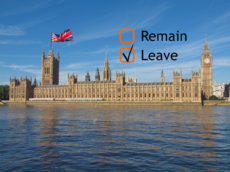Brexit, Sexit, Texit
 Brexit
Brexit
In the short time since the Brits voted to exit the EU, much of the commentary I’ve read views the vote as a move toward isolationism. Regardless of the motivations of the voters, a more accurate way to look at it is that the British voted for self-government rather than government from afar.
The EU originated in the idea of a common market in which goods and people could cross borders unimpeded, giving Europe some of the advantages the United States has had in that regard. That is a good idea. One impediment is the complaint by businesses that the governments of other countries give advantages to their businesses–regulatory advantages, tax advantages, subsidies–that create unfair competition. So, along with open borders came agreements for uniform tax systems and regulations to level the playing field. With its foot in the door, the EU government continued to expand its powers over the member countries. It is easy to argue that while Britain benefits from the open borders, the cost imposed on it by the EU regulatory state ultimately makes Britain a net loser.
The long term consequences of Brexit depend on how the EU responds to Britain’s withdrawal. They can work out trade agreements to leave arrangements between Britain and the EU essentially unchanged, to everyone’s benefit. Or, they can erect trade barriers and place demands on Britain that reduce welfare for both the Brits and the remainder of the EU. Any negative consequences on the British economy will be due to a reduction in gains from trade, so any harm to the British economy will be mirrored by a similar harm to the remainder of the EU.
Some commentators have suggested that with Britain leaving, there may be a contagion effect that will push others to leave. Not too long ago, Greece and Spain were seen as most likely to exit. The possibility of others leaving is a good check on the powers of the EU. The threat that if they impose too great a cost on member states those states will leave might rein in some of the powers of the EU which already seem excessive.
Sexit
One way to think about how Britain will fare outside the EU is to look at Switzerland, which never has been a member. If the EU treats Britain as they treat Switzerland, leaving the EU and opting for self-government should benefit the British economy. Sure, the EU could adopt a punitive stance to retaliate for Brexit, but they didn’t do so for Sexit, when Switzerland decided not to join in the first place. (Yes, I know that’s not really a Swiss exit, so the term doesn’t exactly fit. But it does have a sexy sound to it, and hey, I’m just putting up a blog post, not writing a scholarly research paper.)
Texit
Closer to home, if the threat of leaving the union is a good check on the power of the central government, we in the United States would be better off if states had that option. If the federal government were looking at the threat of Texas leaving the union–Texit–for example,they would be more cautious in their continual quest for power. That seems like a good idea, but we fought a war over it and those favoring the exit option lost. Regrettably, the primary issue in that war was slavery, which continues to taint the view of the exit option in the US. If we could separate the issues of slavery and secession, the possibility of states exiting the union would be a powerful check on the federal government.
If the possibility were there for states to leave the US as they can in the EU, it is easy to envision Texans agitating for Texit. And the possibility of Texit would go at least some distance toward taming the federal Leviathan.


















